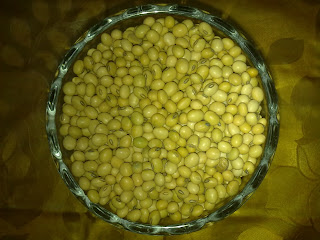Benefits of Soy Meal maker
High Protein Content : According to the Ruchi Nutrition website, Soya Chunks contain 54.2 grams of protein, which exceeds the amount of protein found in meats, eggs, milk and wheat. KidsHealth.org reports that soy protein contains all the amino acids needed by the body, and is an excellent replacement for meat-based proteins. Animal proteins are generally higher in saturated fats. The company's website adds that the soy protein in Soya Chunks can be beneficial to the growth of strong bones and teeth in children.
Benefits to Women :The Ruchi Nutrition website reports that the soy protein in Soya Chunks may reduce the risk of osteoporosis in menopausal women, and may also ease other menopausal symptoms. Similar claims have been made about soy in general, due to the fact that soy contains phytoestrogens, which may have hormonal activity. However, there is insufficient information to support these claims, and soy protein is not considered a medical treatment for osteoporosis or menopausal symptoms.
Cholesterol Benefits :Kids Health.org reports that it was once commonly believed that soy protein could lower LDL cholesterol. However, these claims have been partly refuted by recent research by the American Heart Association, which reported that soy has no direct effect on heart health, Kids Health notes. Soy is high in fiber, which is known to benefit cholesterol levels, and can indirectly lower cholesterol by replacing fatty animal proteins in the diet.
Source of Vitamins :According to Kids Health, soy protein in general is rich in B vitamins and Omega-3 fatty acids, which are thought to benefit many aspects of health. In addition, Ruchi Nutrition reports that Soya Chunks contain 533 milligrams of calcium and 21.2 grams of iron.
Overview :The soybean is a balanced nutritional product that contains protein, carbohydrates, fats, fiber, vitamins and minerals. Soybeans are the only vegetable source of protein that contains all the essential amino acids. For that reason, in addition to being low in saturated fats, they are widely consumed by vegans as a meat substitute. Because of the health benefits of soy products, sales of soy foods and beverages increased by almost one-third between 2003 and 2007, according to an article at the TeensHealth website.
Soybean Oil :Soybean oil is a vegetable oil that is widely used in cooking because of its high smoke point. The processing of soybean oil produces soy lecithin, a natural fat emulsifier. Soybean oil is used to make salad dressings and margarine. It contains healthy monounsaturated, and polyunsaturated fats, including essential fatty acids. According to the Soya website, 100 g of soybean oil contains 7.7 g of linolenic acid, and 54.2 g of linoleic acid, also known as omega-3 and omega-6, which are both essential fatty acids. Soybean oil contains heart-healthy vitamin E, with 100 g of soybean oil containing 17 mg.
Soy Milk :Grinding soybeans and adding water produces a milky liquid. Soymilk is widely consumed as a substitute for cow's milk by vegans and lactose-sensitive individuals. According to The National Soybean Research Laboratory, 1 cup of soymilk contains 7 g of protein, B-vitamins and iron.
Soy Nuts :Soy nuts are produced by soaking soybeans in water for several hours, and then roasting them in an oven. Crunchy and nutritious soy nuts contain essentially the same nutrients as soybeans. They are a source of monounsaturated and polyunsaturated fats, with 100 g of soy nuts containing a total of 19.9 g, as well as 35.2 g of protein, 17.7 g of fiber, 138 mg of calcium, and 200 mg of isoflavones.
Tofu :Tofu is a soy product that has the texture of cheese and is made by curdling soymilk with a coagulant. Tofu is relatively easy to digest and is a rich source of protein and calcium. A 1/2-cup serving of tofu contains 19.9 g of protein. According to Dr. Reed Mangels on The Vegetarian Resource Group website, the amount of calcium in tofu depends on the coagulating agent. For example, 4 oz. of firm tofu, processed with calcium sulfate, provides between 200 and 330 mg of calcium. Tofu is relatively bland tasting and is frequently added to other foods.
Soy Isolates :Soy isolates are versatile emulsifiers that absorb five times their weight in water. They are about 90 percent protein and can be added to meat products to improve the taste, texture and nutrient profile. Soy isolates also add to the juiciness of a variety of meats, including hams and roasts


No comments:
Post a Comment